
Alphabetical Menu
Chronological Menu
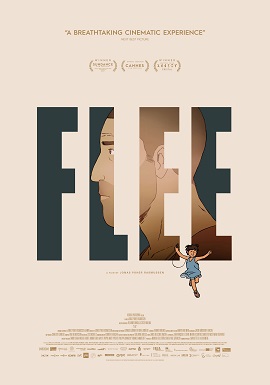
Flee is one of the most moving and cinematic documentaries of the year. Director Jonas Poher Rasmussen interviews a gay man living in Denmark who recalls how he and his family fled Afghanistan in the 1990s when he was a teenager and still in the closet. The man, Amin, whose real name is kept anonymous to protect his identity, has never told his harrowing story except to an ex-lover. He explains in detail the journey that he took and what obstacles he encountered along the way as he ended up separated from his family. He's very brave not only for putting his life at risk by fleeing, but also for talking about those traumatic events so candidly and vividly. Not all of them are traumatic; there are some heartwarming moments, i.e. what happened after Amin came out to his father. Director Jonas Poher Rasmussen puts him at ease from the very beginning by having him lay down and making sure that he's comfortable. Amin's story itself is thrilling, riveting and even terrifying at times, but what's even more potent and emotionally resonant is the emotional journey that he goes through. Flee could've turned into a conventional talking-heads documentary if it weren't for its visual style. Instead, Rasmussen uses animation to show the interview with Amin and the flashbacks to his past. There's some actual documentary footage shown, but it's archival and serves as a reminder that the film you're watching is non-fiction even though it's animated. The animation looks great without going over-the-top in style. What's important, ultimately, are Amin's words, his memories and the feelings that those memories conjure. Prepare yourself for an emotionally gripping rollercoaster ride that's filled with hope, despair, perseverance, thrills, drama and even a little romance. All of those elements could have turned into an uneven, overstuffed mess with a less skilled director. Fortunately, Rasmussen combines it all into a documentary that feels equally captivating and cinematic. Flee is one of the best documentaries and animated films of the year. It's a spellbinding, poignant and heartfelt emotional journey with just the right blend of style and substance. It opens in select theaters via NEON. 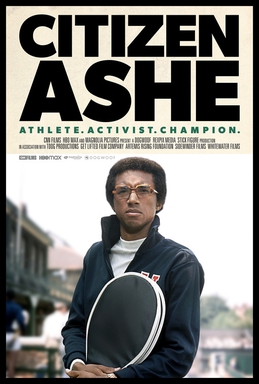
Citizen Ashe is a documentary biopic about Arthur Ashe, the first African American tennis player to win Wimbledon, the Australian Open and the U.S. Open. Co-directors Rex Miller and Sam Pollard combine archival footage and photos of Ashe along with interviews with his wife, Jeanne Moutoussamy-Ashe, his brother, Johnnie, civil rights activists as well as professional tennis players Billie Jean King and John McEnroe. They include the backstory of Ashe's childhood growing up in Richmond, Virginia, but the info isn't presented right at the beginning which makes the doc feel less pedestrian. Ashe was not only a famous tennis player, but also someone who gradually became a civil rights activist and, eventually, spoke out about AIDS which he was diagnosed with later in life. He was very much a humanitarian, although he knew the risks to his career of becoming part of the civil rights movements. Citizen Ashe doesn't have anything particularly revealing to say about Arthur Ashe, but his story is indeed a timely and inspirational one. He makes for a great role model. The filmmakers do the best they can to allow the audience to grasp what kind of a person Ashe was outside of the court to humanize him, but, for the most part, they focus on his humanitarian efforts. You don't have to be a tennis aficionado to be engaged by this doc. There's some footage of his tennis matches, but not too many. It's also worth mentioning the stylish, lively editing by R.A. Fedde, Lewis Rapkin, Federico Rosenzvit, and Ben Sozanski which keeps the film moving at a fast enough pace and helps it to avoid becoming dull. This isn't the kind of doc when you ask at the end, "When's the exam?" or that overstays its welcome. The filmmakers wisely doesn't dwell too much on Arthur Ashe's death from AIDS-related pneumonia It does feel slightly hagiographic and lacking in depth, but at least it remains an engaging and informative introduction to Arthur Ashe for those unfamiliar with him or his activism. At a running time of 1 hour and 93 minutes, Citizen Ashe is a well-edited, inspirational glimpse of Arthur Ashe as a humanitarian activist, a talented, groundbreaking tennis player and a compassionate human being. It opens at Quad Cinema via Magnolia Pictures and CNN Films at Quad Cinema. Benedetta 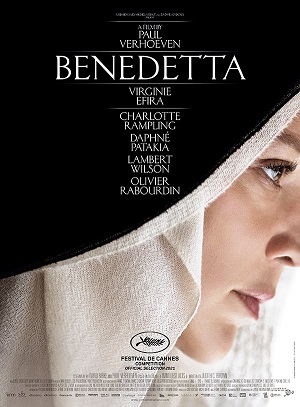 Benedetta (Virginie Efira) has lived in a convent in Pescia, Italy ever since she was a child when a statue of the Virgin Mary fell on top of her there. She suffers from erotic visions of Jesus and engages in a lesbian romance with a fellow nun, Bartolomea (Daphné Patakia). The abbess, Sister Felicita (Charlotte Rampling), witnesses them having sex with each other, so Benedetta now has to stand trial for her sins. Alfonso Giglioli (Lambert Wilson) presides as the judge. Set during the 17th century, the screenplay by writer/director Paul Verheoven and co-writer David Birke, based on the book Immodest Acts: The Life of a Lesbian Nun in Renaissance Italy by Judith C. Browne, begins with a prologue showing Benedetta as a child (Elena Plonka) when he father first brings her to the convent. What follows is a wildly entertaining experience that becomes increasingly outrageous while being unafraid to push the envelope. Verheoven and Birke leave very little to the imagination. Fortunately, Benedetta is more than just a movie about lesbian nuns. While that aspect of the film might be part of its hook, there's a lot going on plot-wise that turns it into a provocative and surprisingly moving story. Its goal isn't just to shock, although it does that with a few scenes that won't be spoiled here. The campy, wickedly funny scenes blend well with the more serious ones. With a less sensitive screenplay, those two contrasting tones would have led to unevenness and clunkiness like watching two different films. Benedetta knows just when to take itself seriously and when not to because the filmmakers don't go too over-the-top in either direction. It might seem like it's a mindless B-movie, but it's much more of a movie that walks a fine line between brilliance and madness, a line that's no easy feat to walk on. Moreover, Benedetta feels like a fully-fleshed, complex human being with a heart, mind and soul. What helps to keep somewhat Benedetta grounded is the superb cast. Casting is a huge part of a film's tone, after all. Virginie Efira provides some charisma in her role as Benedetta and handles the comedic aspects and more tender aspects of it convincingly. It's both an empowering and brave role for her, not for the nudity, which there's plenty of unflinchingly, but for the emotional nakedness that she displays every now and then. Charlotte Rampling adds depth to the film with her performance as Sister Felicita. She and Virginia Efira are the kind of actresses who can add emotional depth even when it's present in the screenplay which is the case here. The same can be said for Lambert Wilson. The cinematography is decent, although some of the visual effects aren't too impressive. Even though it's not outrageous enough to become a midnight cult classic, it comes close, and could still have somewhat of a cult following. At a running time of 2 hours and 11 minutes, Benedetta is an audacious amalgam of dark comedy, satire, religion, campiness, suspense and eroticism. 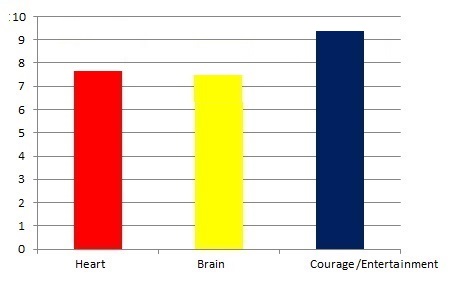 The End of Us 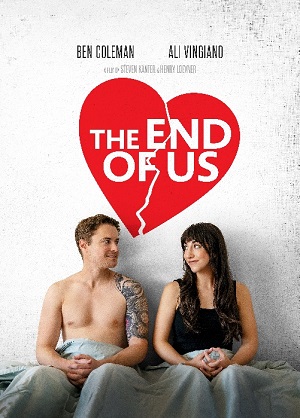 Nick (Ben Coleman) and his girlfriend, Leah (Ali Vingiano) have lived together in Los Angeles for the past few years. They break up right when the Covid-19 outbreak begins, and must continue to live together because of California's stay-at-home order. Nick can't afford to move out, so he finds a job delivering food to make ends meet while meeting up his good friend, Hector (Gadiel Del Orbe). Leah starts dating Tim (Derrick Joseph DeBlasis) and flirts with him during Zoom meetings. He soon confides in her that he's been diagnosed with Covid-19 which sends her and Nick into a state of panic. The screenplay by co-writers/directors Steven Kanter and Henry Loevner doesn't have a lot that's profound to say about relationships, but that's forgivable because there's just enough chemistry between Nick and Leah to make it an engaging, un-Hollywood date movie for our times. The End of Us skips the "meet cute" moment whenever Nick and Leah met a few years prior and jumps head-first into the end of their relationship. They're well past their "honeymoon phase" when the film begins. It wastes no time in getting to the meat of the story when Covid-19 hits which everyone can relate to. The way that Covid-19 impacts their relationship as a "force majeure" is interesting, but not exactly surprising. It's obvious from the get-go that their relationship has become toxic and that she's just not that into him anymore. He still has feelings for her, though, which he can't let go of, and she might feel the same way, but doesn't show it. The screenplay has a few brief glimpses inside the mind of Nick and Leah, but not enough. There's a somewhat contrived scene where Nick meets Tim and lies to him about Leah's gluten allergy when he gives her bread as a gift. Tim seems like a nicer guy than Nick at first, but he's got issues, i.e. when it comes to his obsession with watching one Criterion movie per day. There's nothing wrong with that habit per se, but he pressures Leah to watch them, too, without letting her pick a movie to watch--even when she suggests watching a more light-hearted movie instead, he's too selfish to cater to her needs. It's worth noting that none of the characters comes across as over-the-top or caricatures. They're all flawed in their own way which makes them more human. The only villain in The End of Us is a silent one: Covid-19. The humor is more gentle and amusing than laugh-out-loud funny; this isn't a romantic comedy nor does it try to be. The filmmakers should also be commended for avoiding schmaltz and low brow humor. This isn't a Judd Apatow movie, after all, so don't expect any jokes that involve bodily fluid. The End of Us is not as heartbreaking, unflinching or deep as Blue Valentine or the brilliant Swedish film Force Majeure. At least it doesn't feel clunky, uneven and dull as the sitcom-ish, poorly-cast remake of Force Majeure, Downhill. Ben Coleman and Ali Vingiano are very well-cast and give convincingly moving performances which helps to breathe life into the roles of Nick and Leah. Leah has a particularly moving, well-shot scene when she's laying in bed facing away from Nick as he barges into her room and invades her privacy. He doesn't realize that she's on the verge of tears and doesn't want to be bothered with. Even without any flashbacks to the early part of Nick and Leah's relationship, you can sense that they've already been together for a long time and have a history together. What she saw in him or what he saw in her to begin with are left up to the audience's imagination. The last scene has a clever use of poetry which won't be spoiled here, but it's just as touching and sweet as the poetry in (500) Days of Summer's last scene. It doesn't provide closure, but it leaves room for it and allows the film to live on in the imagination of the audience while also letting the audience project their own life experiences into that interpretation. At a running time of 1 hour and 32 minutes, The End of Us is heartfelt, sweet and timely. It would make for a great double feature with Force Majeure. 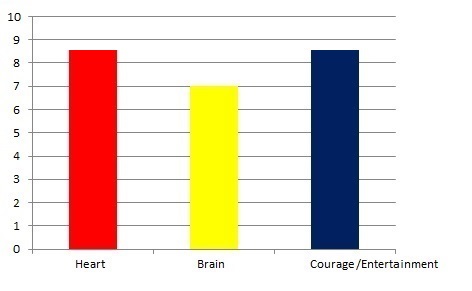 Last Shoot Out 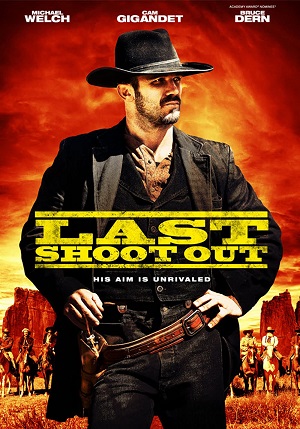
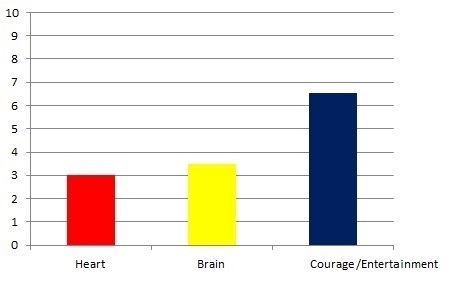 Silent Night 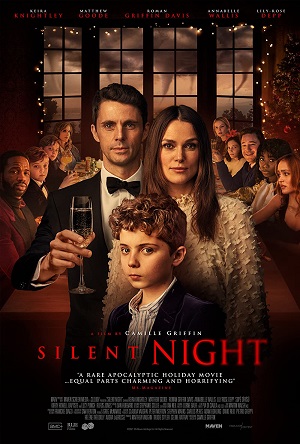 Nell (Keira Knightley) and her husband, Simon (Matthew Goode), host a Christmas dinner party at their countryside home with their friends. The guests include Bella (Lucy Punch), Alex (Kirby Howell-Baptiste), James (Sope Dirisu, "His House"), Sophie (Lily-Rose Depp), Nell's sister, Sandra (Annabelle Wallis), Tony (Rufus Jones), his daughter, Kitty (Davida McKenzie), and Nell's sons, Art (Roman Griffin Davis), Thomas (Gilby Griffin Davis) and Hardy (Hardy Griffin Davis). Meanwhile, a catastrophe in the world around them puts their lives in danger. Unfortunately, despite a talented cast, none of them manage to shine, although the kid actors are pretty good, especially Roman Griffin Davis who gave a breakthrough performance in JoJo Rabbit. They're undermined by the dull screenplay that doesn't utilize their acting skills. They deserve better. The cinematography and editing are decent, but the pacing feels uneven at times. Silent Night simply doesn't amount to much nor is it subversive enough to become a cult classic like horror comedyShaun of the Dead and Bad Santa or recent psychological horror dramas like The Feast and The Humans. At a running time of 1 hour and 32 minutes, which feels more like 2 hours, it's a dark comedy that's neither bold, imaginative, scary nor funny. 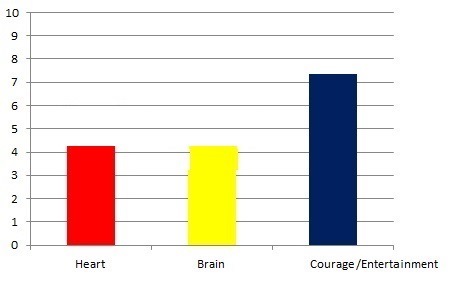 |